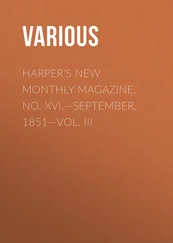Various - Harper's New Monthly Magazine, No. XXIV, May 1852, Vol. IV
Здесь есть возможность читать онлайн «Various - Harper's New Monthly Magazine, No. XXIV, May 1852, Vol. IV» — ознакомительный отрывок электронной книги совершенно бесплатно, а после прочтения отрывка купить полную версию. В некоторых случаях можно слушать аудио, скачать через торрент в формате fb2 и присутствует краткое содержание. Издательство: Иностранный паблик, Жанр: periodic, foreign_edu, на английском языке. Описание произведения, (предисловие) а так же отзывы посетителей доступны на портале библиотеки ЛибКат.
- Название:Harper's New Monthly Magazine, No. XXIV, May 1852, Vol. IV
- Автор:
- Издательство:Иностранный паблик
- Жанр:
- Год:неизвестен
- ISBN:нет данных
- Рейтинг книги:4 / 5. Голосов: 1
-
Избранное:Добавить в избранное
- Отзывы:
-
Ваша оценка:
- 80
- 1
- 2
- 3
- 4
- 5
Harper's New Monthly Magazine, No. XXIV, May 1852, Vol. IV: краткое содержание, описание и аннотация
Предлагаем к чтению аннотацию, описание, краткое содержание или предисловие (зависит от того, что написал сам автор книги «Harper's New Monthly Magazine, No. XXIV, May 1852, Vol. IV»). Если вы не нашли необходимую информацию о книге — напишите в комментариях, мы постараемся отыскать её.
Harper's New Monthly Magazine, No. XXIV, May 1852, Vol. IV — читать онлайн ознакомительный отрывок
Ниже представлен текст книги, разбитый по страницам. Система сохранения места последней прочитанной страницы, позволяет с удобством читать онлайн бесплатно книгу «Harper's New Monthly Magazine, No. XXIV, May 1852, Vol. IV», без необходимости каждый раз заново искать на чём Вы остановились. Поставьте закладку, и сможете в любой момент перейти на страницу, на которой закончили чтение.
Интервал:
Закладка:
Josephine whose tender feelings at times controlled her judgment was urgent in her intercession. Many of the relatives of the wretched man were among her most intimate friends. "This," said she, "is the first favor I have asked since your attainment of the supreme power. Surely you will not deny me?"
"I can not," said Napoleon, "grant your request. And when it is known, Josephine, that even your persuasions could not induce me to commit an act of injustice, no one else will henceforth dare to petition me for such a purpose."
England, Austria, and Russia, together with many other of the minor powers of monarchical Europe, were now combined against France. The Emperor Paul of Russia had furnished a large army to co-operate with the allies in their assault upon the Republic. Ten thousand of the Russians had been taken prisoners. But in the recent disasters which had overwhelmed the arms of France, many thousand French prisoners were in the hands of the allies. Napoleon proposed an exchange. The Austrian government refused, because it selfishly wished to exchange for Austrians only. The English government also refused, assigning the reason that it was contrary to their principles to exchange for prisoners taken from other nations. "What," exclaimed Napoleon to the Court of St. James, "do you refuse to liberate the Russians, who were your allies, who were fighting in your ranks, and under your own commander, the Duke of York?" With Vienna he also expostulated, in tones of generous warmth, "Do you refuse to restore to their country those men to whom you are indebted for your victories and conquests in Italy, and who have left in your hands a multitude of French prisoners, whom they have taken? Such injustice excites my indignation." Then yielding to those impulses, so characteristic of his generous nature, he exclaimed, "I will restore them to the Czar without exchange. He shall see how I esteem brave men." Whatever Napoleon undertook he performed magnificently. The Russian officers immediately received their swords. The captive troops, ten thousand in number, were assembled at Aix-la-Chapelle. They were all furnished with a complete suit of new clothing in the uniform of their own regiments, and thoroughly armed with weapons of the very best of French manufacture. The officers were authorized to organize them into battalions and regiments. And thus triumphantly these battalions of armed men were returned into the bosom of the ranks of the multitudinous hosts, rushing down upon France. It is gratifying to record that magnanimity so extraordinary passed not away unappreciated.
The Emperor Paul was so disgusted with the selfishness of Austria and England, and was so struck with admiration in view of this unparalleled generosity of Napoleon, that he immediately abandoned the alliance. He attached himself to Napoleon with that enthusiasm of constitutional ardor which characterized the eccentric monarch. In a letter to the First Consul, written with his own hand, he said, "Citizen First Consul! – I do not write to you to discuss the rights of men or citizens. Every country governs itself as it pleases. Wherever I see at the head of a nation a man who knows how to rule and how to fight, my heart is attracted toward him. I write to acquaint you with my dissatisfaction with England, who violates every article of the law of nations, and has no guide but her egotism and her interest. I wish to unite with you to put an end to the unjust proceedings of that government."
Russia was thus detached from the alliance, and sending a minister to Paris, recognized the new government. Napoleon now sent an embassador to Prussia to establish, if possible, friendly relations with that power. Duroc, the only one whom Napoleon ever admitted to his ultimate friendship, was selected for this mission, in consequence of his graceful address, his polished education, and his varied accomplishments. – Frederick William was a great admirer of military genius. Duroc, who had been in the campaigns of Italy and of Egypt, could interest him with the recital of many heroic enterprises. The first interview of Duroc with the Prussian monarch was entirely private, and lasted two hours. The next day Duroc was invited to dine with the king, and the Prussian court immediately recognized the consular government.
Notwithstanding Napoleon's vast exaltation, he preserved personally the same simple tastes and habits, the same untiring devotion to the details of business, and the same friendships as when he was merely a general of the Republic. He rose at seven o'clock, dressed with scrupulous neatness, during which time the morning journals were read to him. He then entered his cabinet, where he read letters, and wrote or dictated answers until ten. He then breakfasted with Josephine and Hortense, usually some of his aids and one or two literary or scientific friends being invited. At the close of this frugal meal, he attended the meetings of the Council, or paid visits of ceremony or business to some of the public offices. At five o'clock he returned to dinner, on ordinary occasions not allowing himself more than fifteen minutes at the table. He then retired to the apartments of Josephine, where he received the visits of ministers, and of the most distinguished persons of the metropolis.
In the organization of his court Napoleon was unalterably determined to suppress that licentiousness of manners, which for ages had disgraced the palaces of the French monarchs, and which, since the overthrow of Christianity, had swept like a flood of pollution over all France. He was very severe upon those females, often of the highest rank, who endeavored to attract attention by freedom of dress or behavior. It was expected that men and their wives should appear in society together – a thing hitherto unprecedented, and contrary to all ideas of fashionable life. The court had hitherto taken the lead in profligacy, and the nation had followed. Napoleon thought that by enforcing purity of morals in the palace, he could draw back the nation to more decorum of manners. "Immorality," said he, "is, beyond a doubt, the worst of all faults in a sovereign; because he introduces it as a fashion among his subjects, by whom it is practiced for the sake of pleasing him. It strengthens every vice, blights every virtue, and infects all society like a pestilence. In short, it is a nation's scourge."
On one occasion a courtier, very high in rank and office, one of the imperial chamberlains, requested permission to present his daughter-in-law at court. She was extremely beautiful, and though distinguished by a captivating air of simplicity, was one of the most artful of the daughters of Eve. She joined the imperial parties on all occasions, and wherever she went threw herself in the way of Napoleon. Her soft and languishing eyes were riveted upon him. She sighed, blushed, and affected bashfulness, while, at the same time, she constantly placed herself in situations to attract his notice. Sometimes she would stand, for a long time, apparently lost in reverie, gazing and sighing before the portraits of Napoleon. Her father-in-law affected displeasure at her conduct, and complained of the unfortunate but resistless passion which she had imbibed. Her husband, who was infamously in the intrigue, regarded the matter with the most philosophic indifference. The mother-in-law also made herself busy to help the matter along, saying that, after all, it was hard to blame her for loving Napoleon. For some time Napoleon paid no attention to the intrigue, and appeared not to notice it. At length the affair became a subject of court gossip, and it was necessary that it should be noticed.
One evening, at the close of a sitting of the Council of State, at which Napoleon had presided, conducting Cambaceres into the recess of one of the windows, he said, "Madame B – is rendering herself quite intolerable to me. The conduct of her relations is still more odious. The father-in-law is an infamous man, her husband a mean-spirited wretch, and her mother a vile intriguing woman, by whose arts, however, I am not to be duped. The abandoned female, who unreservedly puts up her virtue to sale, is preferable to the hypocrite who, for motives equally mercenary, affects a sentimental attachment. I wish you to call on my chamberlain, and inform him that I dispense with his services for the space of a year. Inform his wife that I forbid her appearance at court for six years. And make known to the affectionate married couple, that, to afford them an opportunity of duly appreciating each other's excellent qualities, I give them leave to spend six months in Naples, six months in Vienna, and six months in any other part of Germany."
Читать дальшеИнтервал:
Закладка:
Похожие книги на «Harper's New Monthly Magazine, No. XXIV, May 1852, Vol. IV»
Представляем Вашему вниманию похожие книги на «Harper's New Monthly Magazine, No. XXIV, May 1852, Vol. IV» списком для выбора. Мы отобрали схожую по названию и смыслу литературу в надежде предоставить читателям больше вариантов отыскать новые, интересные, ещё непрочитанные произведения.
Обсуждение, отзывы о книге «Harper's New Monthly Magazine, No. XXIV, May 1852, Vol. IV» и просто собственные мнения читателей. Оставьте ваши комментарии, напишите, что Вы думаете о произведении, его смысле или главных героях. Укажите что конкретно понравилось, а что нет, и почему Вы так считаете.












